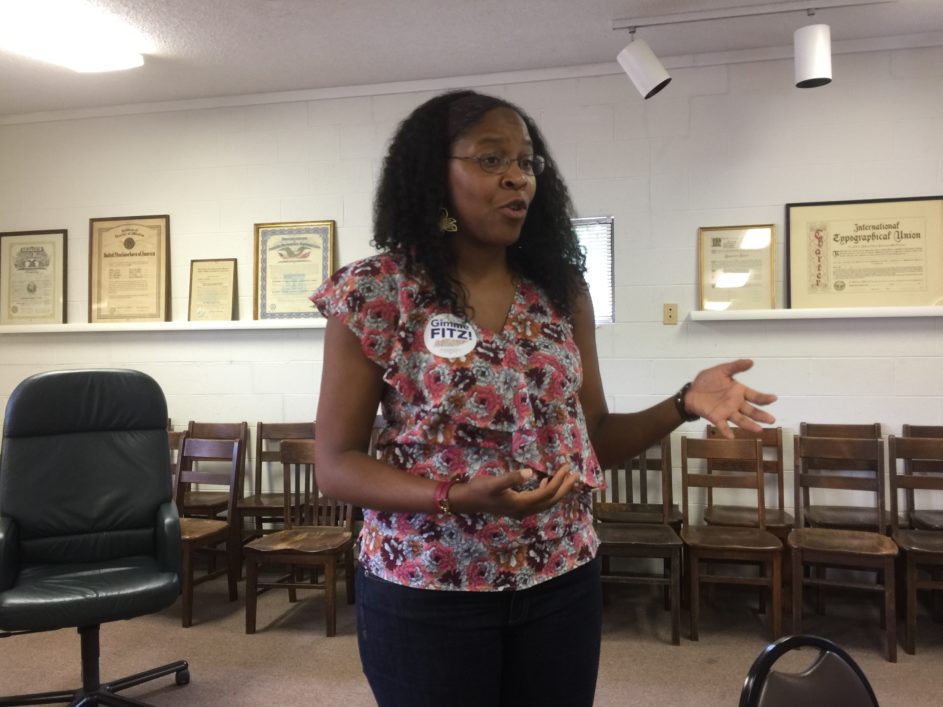Knoxville lawyer LaKenya Middlebrook is busy this summer running gubernatorial candidate Craig Fitzhugh’s East Tennessee operation. There are lots of things she likes about the Democratic state legislator from rural West Tennessee: his honesty, the fact that he’s the only candidate in either major party who is not a multimillionaire and, above all, his track record as a defender of public education.
“I am public school-educated from first grade through law school,” Middlebrook said. “I feel very fortunate that I had parents, teachers and folks in the community who invested in my education, and all that went on in our public schools. One of the things we have to do is make sure our schools work,” she said.
“Unfortunately, we get trapped in the bureaucracy, but we have to make education a priority. If we don’t have an educated workforce we’re not going to succeed. We will be more prone to being oppressed and exploited – you don’t know what you don’t know. Education is crucial.”
That the Knoxville-born Middlebrook would grow up to become an advocate of public education probably doesn’t surprise anyone who knows her history. She was still a student at Sarah Moore Greene Elementary School when her father, the Rev. Dr. Harold Middlebrook, signed her on as named plaintiff in Middlebrook v School District of the County of Knox, Tennessee, a lawsuit intended to halt the closing of inner city schools and the busing of minority students in the name of desegregation.
“In my 10-, 11-year-old mind, I was going to go to court, get up on the stand and tell them what I thought,” she said. “But my dad said I didn’t understand, that it was very complicated and was probably going to be very boring and I wouldn’t get to speak.”
She went anyway and discovered that her father was right.
“I remember sitting on those hard pews. At one point, I probably laid across the pew and went to sleep. I remember a lot of the discussion around what the rezoning would mean. I remember the disappointment and frustration and confusion and anger of coming to understand that I couldn’t attend the school (Vine Middle) that my brother had attended, that my sister had attended. I’d never ridden a bus before and I remember having a lot of feelings about that.
“When it was over, we didn’t prevail. I was very disappointed, but it shaped my understanding that what you perceive as right and just is not always what happens. I think that’s what I remember most about it – being very, very disappointed in ‘the system,’ and feeling that it didn’t work for me.”
She spent the next three years being bused across the river to South-Doyle Middle School. The original plan was to close Vine in stages – eliminating the sixth grade that first year, then the seventh and the eighth in successive years. But when Knox County Schools ditched the plan to close Vine, Middlebrook declined the opportunity to transfer to her neighborhood school.
“They went around to all of the middle schools where they had dispersed the kids to see who would come back. I decided to stay where I was. Nothing at (Vine) had been updated for two years, and I said, ‘There’s no way you’re going to coax me back to a school you bused me away from that you haven’t updated.’
“Then, when we got to A-E, most of us were dual-zoned (some for Carter/Austin- East, some for South-Doyle/A-E, for example). And there we were, kids who hadn’t seen each other for three years, having to come together and re-establish those relationships.”
Going to the same high school that her older siblings, Sherry and Al, had attended worked out well for Middlebrook, who went on to graduate from the University of Kentucky and then from the University of Tennessee College of Law.
“I’m a VolCat,” she says, joking about her dual loyalties come football and basketball seasons. Her law practice is mostly in family law, and she spends considerable time in juvenile court as a guardian ad litem. She also advises small business owners in administrative matters – organizational structuring, contract review, policy and procedural development.
Her mother, Betty, is a retired social worker/educator. Her father is famous for a lifetime of civil rights work, so it’s not surprising that she’s becoming increasingly involved in the life of her community, although she says she has no interest in running for office and will be happy to work behind the scenes for candidates she believes in.
“Service is just kind of who we are. Whether it’s that very obvious activism, or something a little more subtle, it’s always who you are. Even without those lived experiences (of being bused away from her community), this would always be a part of who I am.
“You should be a benefit to your community, not a burden.”

